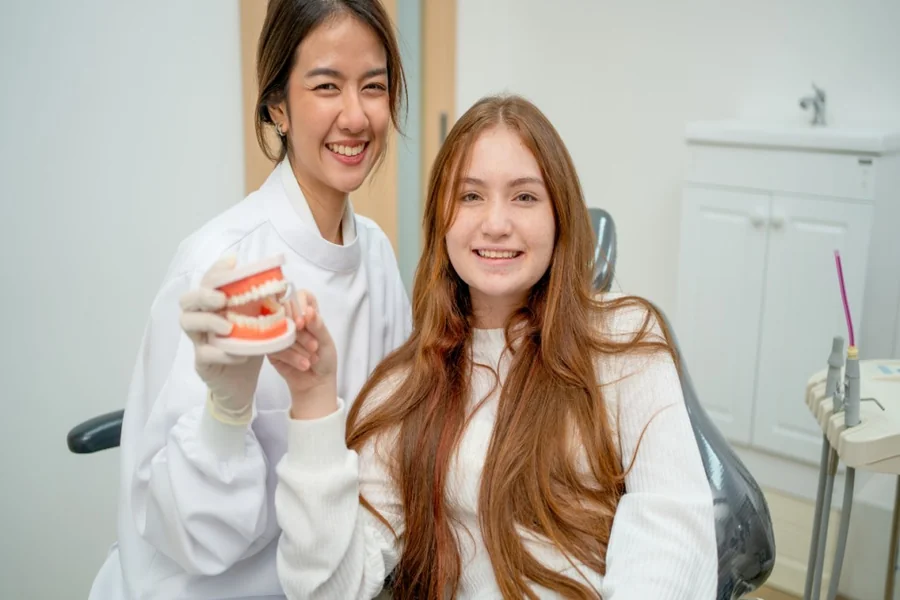Supporting teens during orthodontic transitions can be challenging. You want the best for them during this important phase. Bolingbrook family dental care offers invaluable guidance on how to assist your teen through these changes. Teens often face physical and emotional shifts with braces or other dental appliances. Understanding their feelings and providing support is crucial. You will learn practical steps to help your teen adjust effectively. Whether it’s managing discomfort, addressing self-image concerns, or ensuring daily hygiene, every aspect counts. Building open communication can ease anxiety and foster confidence as they navigate this journey. Each tip we share will equip you with the tools to turn challenges into opportunities for growth. You can empower your teen to embrace their new smile with resilience and positivity. Start this journey with empathy and understanding to make the orthodontic process smoother for both you and your teen.
Tip 1: Address Physical Discomfort
Teens often experience discomfort when they first get braces. This can be due to the pressure and irritation inside their mouths. Offer them pain relief options like over-the-counter pain medication if they feel sore. Providing soft foods can ease their discomfort during meals. Foods like yogurt, mashed potatoes, and smoothies can be gentle on sensitive gums and teeth. Encourage them to use orthodontic wax to protect against irritation from braces. Be sure they follow the orthodontist’s instructions to prevent prolonged discomfort.
Tip 2: Foster Positive Self-Image
Braces can make teens feel self-conscious. Address these feelings by boosting their confidence. Remind them that braces are temporary, and the end result will be a wonderful smile. Share stories about celebrities or older siblings who have successfully completed orthodontic treatment. This can inspire your teen to stay positive about their journey. Encourage them to express themselves through supportive activities, like journaling or drawing. These outlets can help them build self-esteem and feel more in control.
Tip 3: Ensure Consistent Oral Hygiene
Good oral hygiene is essential during orthodontic treatment. Teach your teen the importance of brushing their teeth after every meal and flossing daily. You can offer them tools like interdental brushes or water flossers for easier cleaning. These tools can help remove food particles and prevent plaque buildup. Stress the importance of regular dental check-ups. You can reference the guidelines from the Centers for Disease Control and Prevention which provide more comprehensive recommendations. This will help them maintain excellent oral health throughout their treatment.
Tip 4: Build Open Communication
Communication is key during orthodontic transitions. Listen to your teen’s concerns and feelings without judgment. Provide reassurance and let them know they’re not alone in this. You can initiate conversations about their treatment journey and any challenges they might face. Encourage regular discussions with their orthodontist. This ensures they understand the process and know what to expect. Open communication helps reduce anxiety and fosters trust between you and your teen.
Tip 5: Encourage Patience and Perseverance
Orthodontic treatment requires time and patience. Help your teen stay motivated by setting short-term goals and celebrating small milestones. Celebrate each adjustment appointment or the removal of brackets as steps closer to their desired smile. Acknowledge their commitment and resilience throughout the process. Teach them to view this experience as an opportunity for growth and perseverance. This mindset will not only help them during treatment but also in future challenges.
Common Orthodontic Concerns and Solutions
| Concern | Solution
|
|---|---|
| Mouth Soreness | Pain relief medication and orthodontic wax |
| Difficulty Eating | Soft foods like yogurt and smoothies |
| Self-Consciousness | Positive reinforcement and role models |
| Poor Oral Hygiene | Regular brushing and flossing with specialized tools |
By following these tips, you can provide the essential support your teen needs during their orthodontic transition. Remember that your understanding and patience play a vital role in their journey. As you encourage them to embrace changes confidently, you’ll be fostering a supportive environment that makes a real difference. Explore further insights from the American Dental Association to enhance your support strategy. With the right guidance, your teen can achieve a healthy smile that lasts a lifetime.

